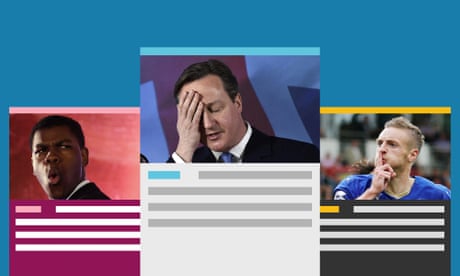Michael Gove v Boris Johnson: the key players
Justice secretary is to run for Tory leadership at former London mayor’s expense, but which background characters gave him the edge?

Boris Johnson and Michael Gove had been in talks for days about running on what many Tory MPs had regarded as a dream ticket after their successful campaign to leave the EU. But they reckoned without the influence of Gove’s wife.
For non-Daily Mail readers unaware of Sarah Vine, illumination came on Wednesday when the email she wrote to her husband expressing anxieties about his planned political alliance was passed to the media.
Seemingly sent by accident to a member of the public, the email lapsed into intermittent capital letters to tell Gove he needed specific promises to guarantee his support for Johnson as Tory leader. “Do not concede any ground,” it ended. “Be your stubborn best. GOOD LUCK.”
Vine and Gove met when both were writers for the Times with close connections to Tory circles.
FacebookTwitterPinterest Sarah Vine with her husband, Michael Gove. Photograph: Jack Taylor/Getty Images
When they married in 2001, George Osborne and David Cameron were among the guests. Vine now has a weekly column in the Daily Mail that generally deals in the sort of subjects common to the newspaper, such as borderline misogynist deconstructions of the Duchess of Cambridge’s eyebrows or complaints about Islam.
She does, however, sometimes write about her marriage, especially with Gove co-heading the leave campaign. On Wednesday she described how Gove went to sleep at 10.30pm on the night of the vote, and awoke to find he had won. “By now his phone was buzzing and beeping like a demented frog,” she recounted. “‘You were only supposed to blow the bloody doors off,’ I said … in other words, you’ve really torn it now.”
The column gave an insight into the seeming joint ownership Vine takes in her husband’s political career, saying the result “means he – we – are now charged with implementing the instructions of 17 million people”. Vine also said she had received a huge amount of abuse on social media: “In a matter of hours, everything sunny about human nature seems to have been sucked out of the atmosphere and you are drenched in little 140-character balls of bitterness.”
Paul Dacre

Scourge of liberals and defender of middle England, the influence of Daily Mail editor Paul Dacre cannot be underestimated, as Vine said in her “leaked” email. The editor is said to “instinctively dislike Boris”, as does Rupert Murdoch, owner of the Sun and the Times. Dacre has also been critical of Johnson’s extramarital affairs that have regularly been reported in his title.
Dacre is Fleet Street’s most-feared and best-paid editor, earning more than £1m a year, although sources said he was not pleased to be named in that email. Today’s Mail comes out in support of Theresa May, unimpressed by the way in which Gove took his last-minute decision to run for the Tory leadership.
Dacre’s tabloid openly yearned for a politician of stature to come forward and “speak for England” and lead the leave campaign shortly before the justice secretary decided to join it.ters
The Mail has been consistently critical of Cameron for his socially liberal politics and the paper’s endorsement of the leave campaign was the least surprising editorial leader of the referendum.
Cameron’s remain campaign had “subjected voters to a barrage of scaremongering”, it said. Leaving the EU would “enable us to fulfil our destiny as one of the world’s greatest trading nations, free to strike deals with any country we like”.
Tales of EU waste and “floods” of immigrants are rarely off the paper’s front page, with the paper forced to print an apology during the campaign for a splash showing a group of migrants who police discovered being smuggled into Britain, under the headline “We’re from Europe – let us in”. It later emerged the people discovered had said no such thing. It may well have been Johnson’s wavering on free movement in a Telegraph article shortly after the Brexit result that could have convinced Dacre that the former London mayor was the wrong man to back.
Dominic Cummings
Political advisers are generally known for their low profile and subtle approach, offering quiet words of advice to ministers in the background. Not Dominic Cummings.
Once an adviser to Iain Duncan Smith and, briefly, the Conservatives’ director of strategy, Cummings achieved prominence as adviser to Gove.
Known for being both highly academically gifted and hugely opinionated, when Gove was education secretary Cummings exasperated civil servants and others in the sector with his apparently unshakeable belief that he and Gove were right in their battles against the “blob” of teachers and educational experts.
Some who disliked Cummings would say this would come out as open disdain and rudeness towards those who did not agree with him. Once this role ended Cummings could be more vocal, labelling Nick Clegg “dishonest” and “revolting”, and penning a long and idiosyncratic personal manifesto for education.
Michael Gove’s former adviser Dominic Cummings. Photograph: David Levenson/Getty Images
He then joined forces again with Gove, heading the official Vote Leave campaign. Here, Cummings emerged even more into the spotlight, with an eye-catching appearance before the House of Commons Treasury committee during which he sparred with Andrew Tyrie, the committee chairman, over some of Vote Leave’s more contentious claims, notably the supposed £350m a week cost to the UK of EU membership.
In one exchange, Tyrie asked Cummings about “misleading” Vote Leave literature using an NHS logo, asking if it was produced by the campaign. Initially saying it appeared to be, he was pressed on this and eventually replied: “Doubt it.”
A Russian speaker, Cummings spent a few years after university seeking to set up an airline in the country.
His current role is unclear. Three days ago he tweeted saying he was not working on any leadership campaigns, telling people to call advisers to Gove or Johnson instead. But few believe he played no part in recent events.
Boris Johnson and Michael Gove had been in talks for days about running on what many Tory MPs had regarded as a dream ticket after their successful campaign to leave the EU. But they reckoned without the influence of Gove’s wife.
For non-Daily Mail readers unaware of Sarah Vine, illumination came on Wednesday when the email she wrote to her husband expressing anxieties about his planned political alliance was passed to the media.
Seemingly sent by accident to a member of the public, the email lapsed into intermittent capital letters to tell Gove he needed specific promises to guarantee his support for Johnson as Tory leader. “Do not concede any ground,” it ended. “Be your stubborn best. GOOD LUCK.”
Vine and Gove met when both were writers for the Times with close connections to Tory circles.

FacebookTwitterPinterest Sarah Vine with her husband, Michael Gove. Photograph: Jack Taylor/Getty Images
When they married in 2001, George Osborne and David Cameron were among the guests. Vine now has a weekly column in the Daily Mail that generally deals in the sort of subjects common to the newspaper, such as borderline misogynist deconstructions of the Duchess of Cambridge’s eyebrows or complaints about Islam.
She does, however, sometimes write about her marriage, especially with Gove co-heading the leave campaign. On Wednesday she described how Gove went to sleep at 10.30pm on the night of the vote, and awoke to find he had won. “By now his phone was buzzing and beeping like a demented frog,” she recounted. “‘You were only supposed to blow the bloody doors off,’ I said … in other words, you’ve really torn it now.”
The column gave an insight into the seeming joint ownership Vine takes in her husband’s political career, saying the result “means he – we – are now charged with implementing the instructions of 17 million people”. Vine also said she had received a huge amount of abuse on social media: “In a matter of hours, everything sunny about human nature seems to have been sucked out of the atmosphere and you are drenched in little 140-character balls of bitterness.”
Paul Dacre

Scourge of liberals and defender of middle England, the influence of Daily Mail editor Paul Dacre cannot be underestimated, as Vine said in her “leaked” email. The editor is said to “instinctively dislike Boris”, as does Rupert Murdoch, owner of the Sun and the Times. Dacre has also been critical of Johnson’s extramarital affairs that have regularly been reported in his title.
Dacre is Fleet Street’s most-feared and best-paid editor, earning more than £1m a year, although sources said he was not pleased to be named in that email. Today’s Mail comes out in support of Theresa May, unimpressed by the way in which Gove took his last-minute decision to run for the Tory leadership.
Dacre’s tabloid openly yearned for a politician of stature to come forward and “speak for England” and lead the leave campaign shortly before the justice secretary decided to join it.ters
The Mail has been consistently critical of Cameron for his socially liberal politics and the paper’s endorsement of the leave campaign was the least surprising editorial leader of the referendum.
Cameron’s remain campaign had “subjected voters to a barrage of scaremongering”, it said. Leaving the EU would “enable us to fulfil our destiny as one of the world’s greatest trading nations, free to strike deals with any country we like”.
Tales of EU waste and “floods” of immigrants are rarely off the paper’s front page, with the paper forced to print an apology during the campaign for a splash showing a group of migrants who police discovered being smuggled into Britain, under the headline “We’re from Europe – let us in”. It later emerged the people discovered had said no such thing. It may well have been Johnson’s wavering on free movement in a Telegraph article shortly after the Brexit result that could have convinced Dacre that the former London mayor was the wrong man to back.
Dominic Cummings
Political advisers are generally known for their low profile and subtle approach, offering quiet words of advice to ministers in the background. Not Dominic Cummings.
Once an adviser to Iain Duncan Smith and, briefly, the Conservatives’ director of strategy, Cummings achieved prominence as adviser to Gove.
Known for being both highly academically gifted and hugely opinionated, when Gove was education secretary Cummings exasperated civil servants and others in the sector with his apparently unshakeable belief that he and Gove were right in their battles against the “blob” of teachers and educational experts.
Some who disliked Cummings would say this would come out as open disdain and rudeness towards those who did not agree with him. Once this role ended Cummings could be more vocal, labelling Nick Clegg “dishonest” and “revolting”, and penning a long and idiosyncratic personal manifesto for education.
Michael Gove’s former adviser Dominic Cummings. Photograph: David Levenson/Getty Images
He then joined forces again with Gove, heading the official Vote Leave campaign. Here, Cummings emerged even more into the spotlight, with an eye-catching appearance before the House of Commons Treasury committee during which he sparred with Andrew Tyrie, the committee chairman, over some of Vote Leave’s more contentious claims, notably the supposed £350m a week cost to the UK of EU membership.
In one exchange, Tyrie asked Cummings about “misleading” Vote Leave literature using an NHS logo, asking if it was produced by the campaign. Initially saying it appeared to be, he was pressed on this and eventually replied: “Doubt it.”
A Russian speaker, Cummings spent a few years after university seeking to set up an airline in the country.
His current role is unclear. Three days ago he tweeted saying he was not working on any leadership campaigns, telling people to call advisers to Gove or Johnson instead. But few believe he played no part in recent events.
Comments
Post a Comment